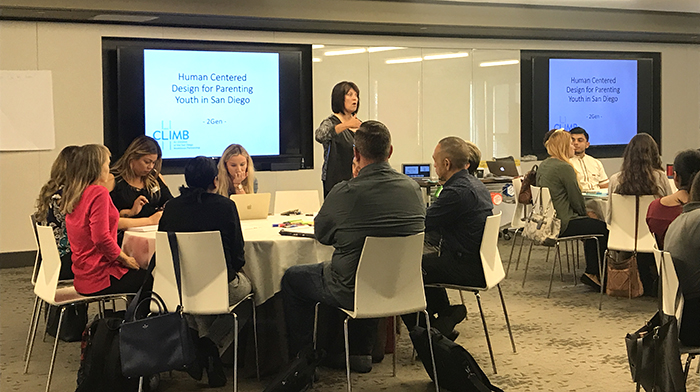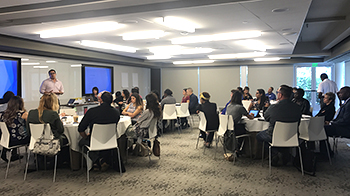
One of the best social changes in America is the dramatic drop in teen pregnancy. Just in the past 15 years, births to teen moms in San Diego County plummeted by nearly half, from 4,277 in 1998 to just 2,244 in 2013 (the latest year for which data is available). This is an enormously positive improvement because teen parents are much less likely to complete high school (let alone college), and being the child of teen parents also bodes poorly for life opportunities.
It is not surprising then, that teen parents are over-represented among our region’s 16–24-year-old opportunity youth (not working and not in school). In Flip the Script: San Diego’s Opportunity Youth, the San Diego Workforce Partnership (SDWP) found that 25.6 percent of female opportunity youth in San Diego County are parents. These young people struggle to juggle the responsibilities of parenting, making money to support their family and trying to further their education.
 SDWP offers quarterly trainings to set youth service providers up for success. Each session creates a platform to exchange information and address the ever-changing problems young adults face. Out of these convenings arose the question, “How might we serve parenting teens and their children for a positive outcome?”
SDWP offers quarterly trainings to set youth service providers up for success. Each session creates a platform to exchange information and address the ever-changing problems young adults face. Out of these convenings arose the question, “How might we serve parenting teens and their children for a positive outcome?”
In an effort to develop a two-generation approach for serving parenting young adults, SDWP—as part of the organization’s new Center for Local Income Mobility (CLIMB)—is facilitating a human-centered design approach to creating these tools. The first workshop, led by SDWP Program Specialist Sandy Bauler, looked to discover new ways SDWP-funded youth service providers can work with parenting young adults to maximize the positive outcomes for two generations—the parents as well as their children.
The immediate goal is to identify innovations that can be implemented with existing resources, through partnerships or with new support from government partners or philanthropy. The series began with a session on September 12 with 40 youth case managers who brainstormed and formed consensus on the biggest challenges and opportunities in supporting parenting young adults. SDWP is using these insights as the basis for interviews and surveys of parenting young adults and a wider group of their service providers, which SDWP will bring back to the group in November to inform their designs for service innovation prototypes. Key partners in the childcare field plan to attend the November session to lend their insights as well.
SDWP is currently looking for young parents ages 16–24 as well as youth service providers to provide feedback on this research. Contact Laura Kohn at LauraKohn@workforce.org to get involved.
